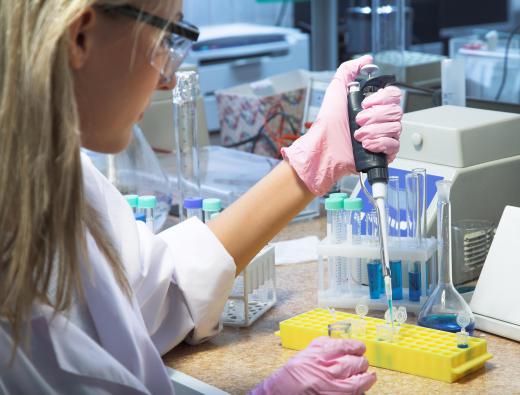At AllTheScience, we're committed to delivering accurate, trustworthy information. Our expert-authored content is rigorously fact-checked and sourced from credible authorities. Discover how we uphold the highest standards in providing you with reliable knowledge.
What are Phospho Antibodies?
Protein phosphorylation is the addition of a phosphate group (PO4) to a specific protein, usually on a serine, threonine, or tyrosine residue. Generally, protein phosphorylation is one of the main ways by which signal transduction and enzymatic activities are regulated in cells. Antibodies that detect these phosphorylated protein sites are called phospho antibodies. The ability to detect the phosphorylated residue of a protein at a specific site is a valuable tool for detecting the activity of cell signaling pathways, and is a key to understanding many cellular signaling processes.
The addition of the phosphate group to a serine, threonine, or tyrosine residue may result in protein activation or inactivation by either inducing a conformational change in the protein, or by influencing the protein’s interactions with other proteins or molecules. Phosphorylation plays a significant role in many important cellular signaling processes, including cell growth and death, pathways that induce or inhibit tumorigenesis, hormonal signaling processes, and energy production. Proteins are phoshorylated by enzymes called kinases, and dephosphorylated by enzymes called phosphatases. The process of reversible phosphorylation therefore allows a cell to exert strict control over these important signaling pathways.

Antibodies are Y-shaped molecules that contain antigen-binding sites at the end of each Y arm. Generally, antibodies recognize unique sequences in their corresponding antigens, which are called epitopes. Antibody production occurs naturally as part of the immune response when a host is exposed to a foreign body, allowing the antibody to specifically recognize, and neutralize, these foreign antigens. This natural process can be used for research purposes by generating antibodies that will specifically detect an antigen or protein of interest. When generating research antibodies, the host species are frequently rabbits, mice, sheep, or goats, but researchers can also use immune cells in culture to generate antibodies against the antigen of interest.

Phospho antibodies can be used in either research or clinical applications. In clinical settings, the detection of a particular phosphorylated protein by a phospho antibody in a tumor sample may help to assess tumor grade, or even to help predict disease outcome. In research settings, phospho antibodies are frequently used to study the activation of cell-signaling pathways in response to a specific stimulus.

Many antibody production companies are available to supply phospho antibodies to researchers and clinicians. Researchers can select these antibodies from an antibody catalog, which often contains reagents for hundreds of different phosphorylated proteins. In addition, several antibody suppliers offer the production of custom antibodies for rarely studied phosphorylated proteins for which a commercial phospho antibody is not available.
AS FEATURED ON:
AS FEATURED ON:














Discuss this Article
Post your comments